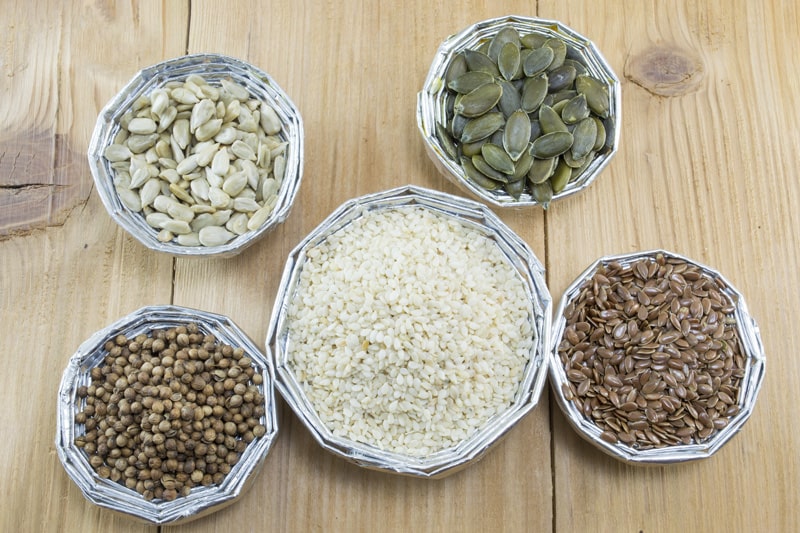
Super Seeds to Add to your Shopping List:
Seeds are nutritional powerhouses. They are a terrific snack and easy to add to salads and smoothies. Unlike nuts, they are easy to digest. Nuts can be difficult to digest because of their high protein count; and should be eaten in moderation as they are high in fat and calories. If you generally eat a limited amount of protein, 1/4 of a cup of nuts here and there will not be a problem for you. When eating nuts and seed, please make sure that they are organic and raw- not pasteurized or bleached and coated in salt or sugar.
For a complete article on nuts, you may check back to an article that I wrote, titled Healthy Benefits of Nuts.
Pumpkin and sunflower seeds are an excellent snack to send your kids off to school with. Additionally, seeds can benefit men’s prostate health as seeds are high in zinc.
Pumpkin seeds contain a wide variety of nutrients including:
- Magnesium
- Manganese
- Copper
- Protein
- Zinc
Sunflower seeds also contain a wide variety of nutrients including:
- Vitamin E
- B-vitamins
- Magnesium
- Potassium
- Selenium
- Sodium
- Iron
- Calcium
- Phosphorus
- Fiber
- Vitamin C
- Protein
Most importantly, sunflower seeds are HIGHER than any other nut or seed in the antioxidant photo-chemical tocopherol, which helps to protect against cardiovascular disease.
Chia, hemp, and flax seeds are growing in popularity due to their high nutritional values. I always encourage my clients to add a variety of seeds to their salads. For example, hemp seeds, also known as hemp hearts, are rich in healthy fats, protein, and minerals and are a great addition to salads. They are composed of more than 30 percent healthy fats, including the essential fatty acids linoleic acid and plant based omega-3 . If you eat a predominantly plant based diet, I would recommend adding hemp to your salads and smoothies daily.
Hemp seeds are approximately 25% protein and contain nutrients including:
- Vitamin E
- Phosphorus
- Potassium
- Magnesium
- Sulfur
- Calcium
- Iron
- Zinc
Flax seeds (also known as linseeds), are a rich source of micronutrients, dietary fiber, manganese, vitamin B1, and the essential fatty acid alpha-linoleic acid, also known as ALA or omega 3. On a personal note, because flax seeds contain compounds called “lignans “, which have an “anti-estrogenic” effect, (interfere with enzymes that are involved with the production of estrogen), I tend to air on the side of caution and recommend chia seeds more often.
Chia seeds are a great source of the following:
- Protein
- Omega-3 fatty acids
- Iron
- Calcium
- Magnesium
- Fiber
I add chia seeds to salads and smoothies daily. Be careful to not add too many though because, depending on the size of the seed and type of liquid, the seeds can expand anywhere from 12 to 27 times their weight in matter. They have a unique blend of insoluble and soluble fiber, which creates a gelatinous effect when soaked in liquids. I added too many to my smoothie last week and could barely drink it!
Finally, I would like to leave you with a tip on how to store your chia seeds for ease of use. Angela Liddon, in her fabulous Cookbook, titled “oh she glows” recommends filling a salt shaker with chia seeds so that it is always handy and easy to add to smoothies and salads. What a great idea! Check out her book for some wonderful recipes using these powerful seeds. Enjoy!



